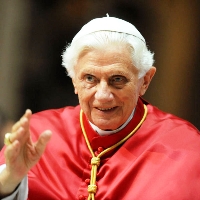Pope Benedict’s Farewell to a World full of Sorrows!
| Okello Oculi, leading intellectual, social activist, head of Africa Vision 525 Initiatives |
Two hours to the end of his eight year pontificate, Pope Benedict the 16th bade farewell and uttered his last blessings to the world as Pontiff from the balcony at Saint Peter’s Square at the Vatican. Then to a friendly and cheering crowd of the faithful and the curious that came to see him in their multitudes the Pontiff turned his back. But Benedict seemed at that moment even more popular, probably because he had shown the way.
The Pope’s last Safari as he left the Vatican and boarded a helicopter that took him to the Papal summer resort near Rome was captured on BBC Television. Since he threw his bombshell the Pontiff took on the image of some slow flowing lava destined to sweep all in its path. And he seemed to relish the role. The Papal eruptions shook the foundations of the Church and sent shock waves that woke up the ancient institution from its seven centuries of virtual sleep walk.
Benedict or Cardinal Ratzinger is known for his intellectualism and his habit of retrospection. Now as he pondered the hour and set his eyes one last time upon the exquisite Papal resort that previous Pontiffs had enjoyed till mortality called he appeared to experience a tremor. A frail servant of the Lord, the Pope had of his own freewill, let go his job as the heir to the throne of St Peter. Because Christ his master could no longer obtain from him, the full measure on the Lord’s outlays. In a modern world this was logical and rational.
Whether or not he intended it Pope Benedict by his bold act had set in motion what must be the beginning of the birth pangs for the politics of a new Church. That hopefully will wash away some of the iniquities of the old Church, which are legion.
One might wonder what this has to do with the world outside the Church or with South Africa or Africa in particular? If you fancy the blame game you could blame the BBC. Because no sooner had the network finished with its fare on the retiring Pontiff that it took by the hand its unsuspecting hordes of the faithful and flung them straight in the midst of the most horrendous spectacle.
Television viewers from across world suddenly found themselves glued to the gruesome scene in which South African police manhandle, handcuff and chain a man to the back of their police van that promptly drove away. Poor man, his body trailed behind the van, his buttocks grazing the tarmac like logs bound for a building site. His crime was a simple traffic misdemeanor. The man, a taxi driver from the neighboring state of Mozambique was of course dragged to death.
It was a ghastly narrative of grotesque violence such as had been routinely perpetrated on victims of police terror under Apartheid. In its turn, now the new post apartheid democracy allows its police to freely commit many such despicable crimes in full view of horrified and protesting citizens.
The sad incident recalled for me the image I once saw on the cover of the book: After Mandela, the Battle for the soul of South Africa, by Alec Russell published in the year Mandela left office as the first post-apartheid leader in 2009. On the book cover sleek skyscrapers, glass and steel, overlook ramshackle shanty neighborhoods. A poster with Thabo Mbeki’s face on it exhorts: Vote ANC. Inside in the book’s narrative, a group of teenage boys accost a taxi driver, strip him and march him along a Soweto street and there they beat him to death. It was common and routine ritual.
In Russell’s narration, centuries of racial repression, applied with brutal and scientific rigor, embedded a culture of violence. Soweto was its product per excellence. Franz Fanon, the Algerian revolutionary, had long ago demonstrated how violence hurts both its victims and its perpetrators. South Africa today is a good illustration of Fanon’s insights.
Again in South Africa, last August television pictures showed police coolly taking aim at a group of striking miners near Johannesburg. In the event they shot dead a total of 34 un-armed men in cold blood.
Last month in Pretoria on the feast of Saint Valentine a world famous athlete still at the peak of his career, fired a volley of shots at his own girlfriend with whom he had been together in his own bed moments before, killing her. Poor girl, the man claimed he mistook her for an intruder. In a racial and male dominated world his actions were full of undertones. Magistrate granted bail.
But South Africa is not alone. There are states and governments in Africa and elsewhere in the world that have committed unspeakable atrocities and acts of genocide on their own people. With the departure of Pope Benedict and especially the manner of his exit, the Church will come under fresh and intense scrutiny.
The Cardinals are gathered in Rome to elect a successor who may well be before you read this piece on his throne at the Vatican*. Regardless, the new man will have to operate within a new Church and in a different world than the one that went before. It could not again be business as usual, even at the Vatican.
*The College of Cardinals has since chosen Cardinal Jorge Mario Bergoglio of Argentina as the new man. The first Jesuit and the first none European to occupy the position he will be called Pope Francis I




